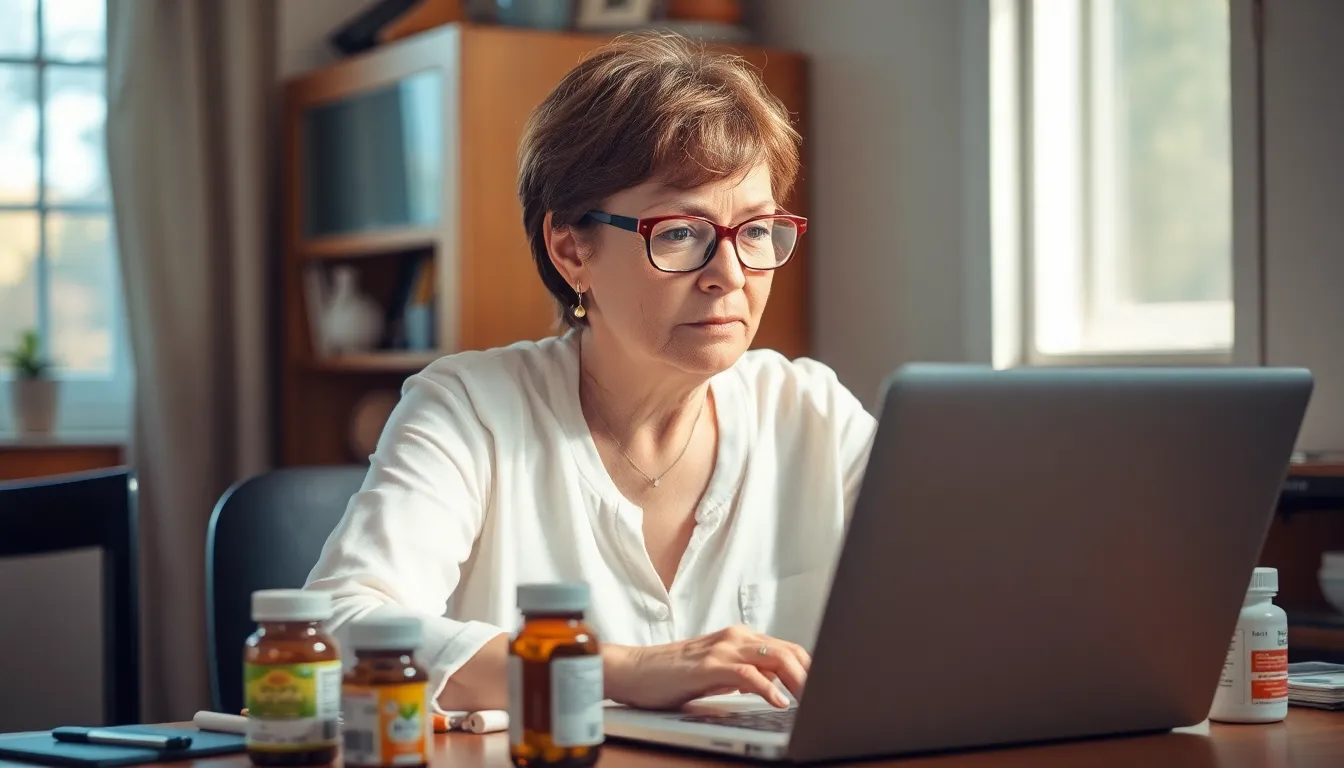Table of Contents
ToggleImagine waking up one day and realizing that the world isn’t just a blurry mess. For many, that’s the reality of macular degeneration, a condition that sneaks up on vision like an uninvited guest at a dinner party. But what if there’s a way to kick that guest to the curb?
Understanding Macular Degeneration
Macular degeneration is a progressive condition affecting the central part of the retina, leading to vision impairment. This condition can significantly disrupt everyday activities like reading or recognizing faces.
Types of Macular Degeneration
Two primary forms exist: dry macular degeneration and wet macular degeneration. Dry macular degeneration occurs due to thinning of the retina, often leading to gradual vision loss. Wet macular degeneration, caused by abnormal blood vessel growth, can result in severe and rapid vision loss. Each type presents unique challenges and requires different treatments, thus understanding these distinctions is vital for effective management.
Symptoms and Diagnosis
Common symptoms include blurred vision, difficulty seeing in low light, and the presence of dark or empty areas in central vision. Eye examinations using tools like optical coherence tomography (OCT) help diagnose macular degeneration accurately. Regular eye check-ups play an essential role in early detection, providing opportunities for treatment before significant damage occurs.
My Journey: I Cured My Macular Degeneration

She faced a daunting diagnosis of macular degeneration. This diagnosis arrived during a routine eye examination, leaving her uncertain about the future. Challenges quickly mounted as blurred vision began disrupting daily tasks. Recognizing the impact on her life prompted a search for solutions. Family and friends noticed her struggles, urging her to seek treatment options.
Initial Diagnosis and Challenges
At first, the impact of her condition felt overwhelming. Initial tests revealed dry macular degeneration, indicating a slow decline in vision. Symptoms included difficulty reading and seeing faces clearly. Frustration grew with each passing day as daily activities became increasingly challenging. Understanding the condition and its progression was crucial for her emotional well-being. Articulating her fears to the doctor helped clarify her path forward.
Treatment Options Explored
She began exploring various treatments, eager to regain her vision. Various options included nutritional supplements, such as vitamins C and E, which showed promise in slowing progression. Additionally, she considered injections for wet macular degeneration, recognizing their potential effectiveness. Comprehensive eye care followed, featuring regular check-ups and lifestyle adjustments. Seeking guidance from specialists proved instrumental in formulating her treatment plan. Research on emerging therapies inspired hope, motivating her to remain proactive in her journey.
The Role of Lifestyle Changes
Lifestyle changes significantly contribute to managing macular degeneration. Effective strategies include dietary adjustments and regular physical activity.
Diet and Nutrition
Incorporating nutrient-rich foods benefits eye health. Leafy greens like spinach and kale provide antioxidants that protect retinal cells. Foods high in omega-3 fatty acids, such as salmon and walnuts, support visual function. Additionally, antioxidants like vitamins C and E, found in citrus fruits and nuts, assist in reducing oxidative stress. A balanced diet should include colorful fruits and vegetables to maximize nutrient intake. Supplements with lutein and zeaxanthin also promote protective effects against macular degeneration. Adopting these dietary habits fosters better overall health.
Exercise and Eye Health
Regular exercise enhances blood circulation and supports overall health. Engaging in aerobic activities positively impacts vision. Activities like brisk walking, swimming, or cycling can strengthen cardiovascular health, promoting optimal eye function. Maintaining a healthy weight also reduces the risk of developing complications associated with macular degeneration. Furthermore, safe eye exercises may improve focus and eye coordination. Staying active fosters both physical and emotional well-being, reinforcing the importance of regular movement in daily life. Prioritizing these activities boosts resilience against macular degeneration.
Alternative Therapies and Remedies
Alternative therapies can offer additional support in managing macular degeneration. Various options exist for individuals seeking complementary approaches.
Natural Supplements
Natural supplements may play a crucial role in eye health. Lutein and zeaxanthin, commonly found in dark leafy greens, are known to help filter harmful blue light and reduce oxidative stress. Omega-3 fatty acids, present in fish like salmon, support retinal health and may slow degeneration. Regular intake of antioxidants, such as vitamins C and E, can enhance overall eye function. Some individuals consider taking supplements that contain these nutrients, especially when dietary intake lacks sufficient levels. Consulting a healthcare professional before starting any regimen remains essential to ensure compatibility with existing treatments.
Vision Therapy Approaches
Vision therapy encompasses various exercises aimed at improving visual function and comfort. Customized programs can enhance coordination between eye muscles, which might benefit those experiencing vision impairment. Techniques include focusing exercises and tracking activities. Experts often recommend these approaches to help patients regain clarity and reduce visual fatigue. Regular sessions with trained specialists maximize effectiveness and adaptability. Individuals can also integrate simple exercises into daily routines to strengthen visual skills. These approaches aim to support individuals on their journey to better eye health and quality of life.
Curing macular degeneration is a journey that requires determination and a proactive approach. By understanding the condition and exploring various treatment options individuals can regain control over their vision and quality of life. Lifestyle changes play a crucial role in this process. Incorporating nutrient-rich foods and regular exercise can significantly impact eye health.
Alternative therapies and supplements can also provide additional support but should always be pursued with professional guidance. The personal account shared highlights the importance of resilience and seeking help. With the right knowledge and support individuals facing macular degeneration can find hope and make meaningful strides toward better vision.







